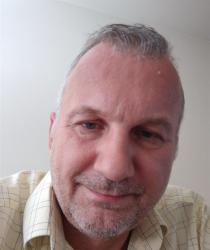
The son of a father who worked for Shell in Africa, Andy Kemp was following a well-trodden path when he arrived as a boarder at Dunhurst at the age of eight. “I think the choice of Bedales may have been made for me on the basis of location as much as anything else, Andy suggests with his tongue slightly in his cheek. “The family’s UK base was in Dorset so it was a matter of finding somewhere suitable within reasonable distance of home and airport.”
A disastrous initial week at his new educational home was not, happily, a herald of worse things in store for young Andy. “I was spectacularly notorious for crying incessantly throughout my first few days at Dunhurst,” he laughs, “but I got over that and quickly became one of the last to want to go home when holidays came around. I’ve got to say that my memories of Bedales as a whole are happy ones – it felt like my home for ten years.”
By his own admission, Andy was something of a jack-of-all-trades at school. “It’s certainly true that a number of people who performed really well had a specific passion that they followed, but I wasn’t among their number,” he reflects. “Bedales was a big society in which you could dabble at a lot of things without necessarily being great at them. I wasn’t arty but I did some art, a fair bit of design, where David Butcher and Martin Box were great characters, of course, and was generally never short of something to do.”
A then rare Bedalian S-Level maths student, Andy pays generous tribute to the teaching that he received at the school. “Dennis Archer and his colleagues in the maths department were extremely good and then there was Don Spivey for chemistry,” he recalls. “I seem to remember that there was a splinter taped to the wall in one of the common rooms as a memento of the time that Don’s chair had bitten the dust during one of his experiments!”
Bedales was essentially an enormously positive experience for me and there’s certainly no other school to which I’d rather have been sent.
With the benefit of hindsight, Andy concedes that his happy decade at Bedales could have been even more successful than it was. “I was a late bloomer as far as maturity goes,” he admits. “Had I grown up a bit earlier, I might have done better or at least made more of the opportunities that were on offer and that I didn’t always appreciate at the time. I should have done, not least because my own character was always quite a Bedalian one – I knew when to challenge the boundaries of authority and how to adapt to different situations and I was always pretty good at interacting with other people. There was always the chance to make your own statement at Bedales, whether in the debates that were always taking place or elsewhere, and I think all those positive attributes that the school stood for were in me somewhere. They just came out a bit later, I like to think!”
Imperial College London would be Andy’s destination after Bedales, an experience that he does not view in the same positive light as his school days. “You couldn’t have found a more different place from Bedales if you tried,” he says. “It was quite geeky and formal and I can’t say that it particularly suited me – probably too much like a sausage manufacturing sort of institution for me.”
Following in his father’s footsteps, Andy joined Shell after university. “A bit of nepotism there, I expect,” he chuckles. “I’d actually spent a lot of my gap year working at an oil refinery up near Ellesmere Port, which I’d really enjoyed, and the Shell way is to have regular staff reviews and then to move you on through the company if you’re doing OK. After a bit, I went from the technical side of the business to Shell Mex House in London, where I was part of a department whose task was to co-ordinate the various company strands, such as refining, marketing distribution and trading, reconcile the egos involved, and get them talking to each other. It was quite an elevated position of responsibility, when I think about it, and I learned a lot from an early stage about crisis management and fire-fighting.”
His refining experience landed Andy his next job within the Shell umbrella, this time trading in refinery intermediaries for Shell International. “They happened to be missing a trader for that at the time and I was adaptable enough to handle what was needed,” he explains. “Trading’s a very personal thing and over the ensuing years I ended up working with a lot of high-powered, very driven people from a variety of backgrounds, some of whom might have left school at 16 and worked their way up through the ranks.”
Oil trading would prove to be Andy’s final hurrah at Shell. A friend of his from university days now offered him the chance to join him in working for a Geneva-based trading company with its own independent refinery in Antwerp. “It was great to be somewhere that you could be light on your feet and consequently innovative and inventive,” he says. “We were ahead of the industry curve a lot of the time, which was fun, and it’s not stretching a point too far to suggest that there was something a bit Bedalian in the way in which we built our relationships.”
Andy pauses to explain something about the nature of the industry in which he has worked for so long: “In this line of work, people can buy and sell the same cargo dozens of times, which is fine as long as you know where it is and what happens when the music stops. It’s a game, one that I used to play like one of those old video games, and in the end it became too much of a game for my liking. Platts, the oil and gas reporting agency, were essentially our most important client and eventually what I was doing came to seem a little like Groundhog Day. We were making plenty of money but I felt that there had to be something else out there. These days, by the way, the trading market is much tougher than when I was in it – you’re much more restricted now and the rules of the game have become far tighter.”
A spell running Goldman Sachs’s black oil desk in London and another with Salomon Brothers’ commodity trading arm were the precursor to Andy’s move to one of the oil & gas sector’s most renowned and controversial names - Enron. “I was courted by a guy called Greg Whaley, one of the cleverest, most inspirational people I’ve ever met, and one of the few who could really think outside the box,” he relates. “He really sold the place to me and for a while, of course, it looked like there was no stopping Enron. When I joined, there might have been 35 people in London and by the time I left two or three years later, the office was ten times that size. The big problem was that I could see that the plans were not adapting with ever increasing scale, which is why I left, and I have to say that Enron’s ultimate fate wasn’t exactly a surprise to me.”
The time had come for Andy to set up his own oil trading company. “I didn’t want to die wondering whether I could have made a go of it,” he reflects. “It’s not so much a sense of freedom, exactly, because when you become your own boss, you’re signing up for continuous work, but it was very motivating and undoubtedly the right thing to do from my point of view.” Initially based in Geneva, the business quickly acquired an oil terminal for a relative song from a Danish group and was soon striking out in a new direction.
“In 2006, I started off a joint venture with a few others that is now known as EPIQ (www.epiq.me),” Andy explains. “The idea was to look across the Middle East and North Africa initially and meet the growing need for safe and practical technology that could be used to solve oil-related environmental problems, and we began in Amman cleaning refinery waste oil pits. By some strange process, I ended up living in Beirut, where I had previously bought a flat, which has been simultaneously great fun and enormously chaotic. Whenever I’m back in the UK on business trips or family visits, I think how nice it is to have a bit of order in your life at times!”
As EPIQ has grown across the Middle East, so the combustible geopolitical climate of the region has occasionally taken toll of Andy’s best endeavours to place it on a sound footing. “We’ve covered a lot of ground and yet sometimes I feel that I’ve only just started,” he says. “The catastrophes in Syria and Yemen meant that we had to get out of these countries pretty quickly. We also had almost all our equipment in Syria stolen by ISIS. These created big holes for us to dig ourselves out of. But when we left Syria, we took with us a chemist called Mohammed Assad, who’s no relation to the President, by the way, and set him up in a laboratory in Sudan, where he has managed to discover a fast method of cleaning up oil which has seeped into the ground and created environmental havoc.”
The possibilities for such a useful new technique are not lost on Andy. “Our resources are not huge but the thing is now to see how best to use the invention and if we can or should patent it,” he says. “We’ve got a good track record in places such as Lebanon, Sudan and India, but the need for something specific like this is huge in all sorts of places – think of Kuwait, Iraq, right across the Niger Delta and so on and the potential is awesome. What’s important about a business is how you build it and its inherent value, and even though ours isn’t making much at the moment, I wouldn’t sell it for £10 million. So for now, we’ll keep spinning the plates because you never know what may happen next.”
His cheerful ability to adapt to any circumstances is something that Andy ties back to his days at Bedales. “That and a number of other things,” he says. “Bedales was essentially an enormously positive experience for me and there’s certainly no other school to which I’d rather have been sent. Whenever I meet other OBs these days, the years fall away and I think back to happy times.”

